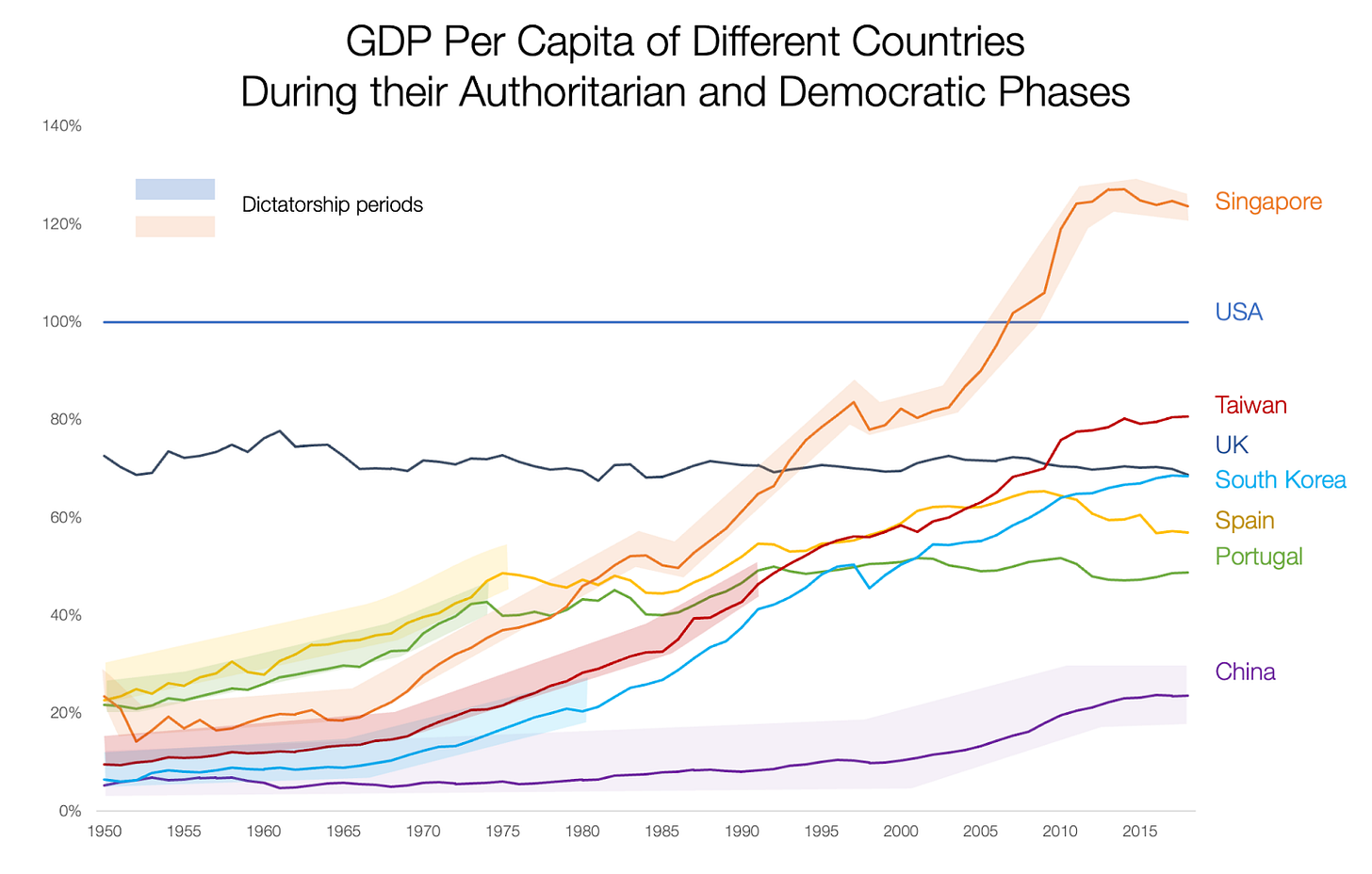🕊️ #28: Freedom will always win
🕊️ Freedom will always win (🔗)
Artículo de Uncharted Territories
The Free World fears China’s rise. It will soon be the largest economy in the world.
People witness the speed of Chinese construction with awe.
But they laugh at the US’ sluggish progress.


So will authoritarianism win? Is it a viable model? Will China show the world that an authoritarian regime can become the world’s biggest economic power and lead the rest of the world? Will other countries take inspiration from China and follow its path?
Maybe it’s already happening, as authoritarianism is creeping up everywhere, repeating the 1930s one century later: Russia’s Putin, Venezuela’s Chavez and Maduro, Turkey’s Erdogan, Hungary’s Orban, Brazil’s Bolsonaro, Philippines’ Duterte, USA’s Trump, Italy’s Meloni… Can these models prevail?
There are certainly precedents of authoritarian regimes succeeding. Singapore’s Lee Kwan Yew, Taiwan’s Chiang Kai-shek, South Korea’s Park Chung-Hee, China’s Deng Xiaoping—and successors like Jiang Zemin and Hu Jintao.
So is authoritarianism a viable contender for political success?
Here’s why I don’t think so:
1. You can’t grow past a certain level without freedom of speech.
2. And once you have freedom of speech, you can’t avoid democracy.
Growth Requires Freedom of Speech
For a simple reason: You can’t improve what you can’t criticize. You need to be able to look at something and say: This doesn’t work.
If you can’t criticize something, you can’t identify problems, so you can’t solve them.This is what freedom of speech does: It allows people to criticize how things work. It identifies problems, so it leads to more rapid progress.
But in an authoritarian rule, you can’t! Remember what China did to the doctor who sounded the alarm on COVID, how they shut him down? How they silenced Jack Ma for challenging the government through tech wealth and power? How the state controls the media in countries like Russia?
The inability to identify and tackle problems is the biggest handicap of severely restricted speech. Here’s another example: In Russia, you can’t criticize the government overtly, or the powerful will penalize you—maybe even kill you. But since you can’t criticize the government, the government doesn’t know about the problems that exist! Listen to the Russian soldiers complaining about the system on social media. Their bosses lie to them, and to their own bosses, but they can’t say anything about it. They’re powerless. So they go to social media.
The lines represent the countries’ GPD per capita as a share of the US’. The colored overlay corresponds to the phases when they were authoritarian.
Many of them grew during their authoritarian phase: Spain, Portugal, South Korea, Taiwan… But all began in extreme poverty and opened up to the US while they were still authoritarian, taking investment and best practices from it.
Then many of them transitioned to democracies. Some of them kept growing, like South Korea and Taiwan. Others also continued, but at a slower pace—countries like Spain or Portugal. Note that when they joined the European Union in the early 80s they started growing fast again.
Some authoritarian regimes grow early on, as long as they’re catching up with other countries. Because when you’re dirt poor, it’s easy to see what your richer neighbor has invented and copy it while keeping authoritarianism. What you can’t do is invent it yourself. Because invention requires challenging the status quo, and every citizen in an authoritarian regime knows that is something you can never do.
The Myth of the Productive Dictator
In summary, I’m saying that countries with the most freedoms are also the most successful, and the only reason that’s not obvious is because authoritarian regimes hide it. If all of this was true, what would we see?
Wealth and freedom should go hand in hand.
Authoritarian regimes should consistently grow less than equivalent democracies.
The perception of authoritarian productivity should show holes the moment media suppression weakens.
All these things are true indeed.
Wealth = Freedom
Indeed, the more democratic a country, the richer it is.
Takeaways
So summarizing, freedom of speech drives both economic growth and helps generate other freedoms, despite what authoritarian regimes would prefer to convey.
What does it mean for you for the future?
First: We shouldn’t be so scared of China. It will keep growing, but at some point its growth measured in GDP per capita will slow down to the level of the rest of the world’s—if it hasn’t already. It might still become the biggest economy in the world, but not because its citizens are the richest, simply because they’re the most.
Until now. India’s population has probably surpassed China’s.
And although India doesn’t benefit from China’s efficient government, and has lots of regulations, it still has substantially more freedom than China. That freedom costs it in the short term, but is an asset in the long term. Eventually, it will surpass China in GDP per capita. It’s a matter of time. It will take decades, but it will happen.
The consequence is that for the developed world, it matters much more to befriend India than to antagonize China.
Also, we should fight the growth of authoritarianism in the world, but we shouldn’t have an existential fear of it. The USSR lost to the USA because of freedom. It might take more or less time, but authoritarian regimes will lag so far behind that most of them will eventually transition to a liberal democracy.








